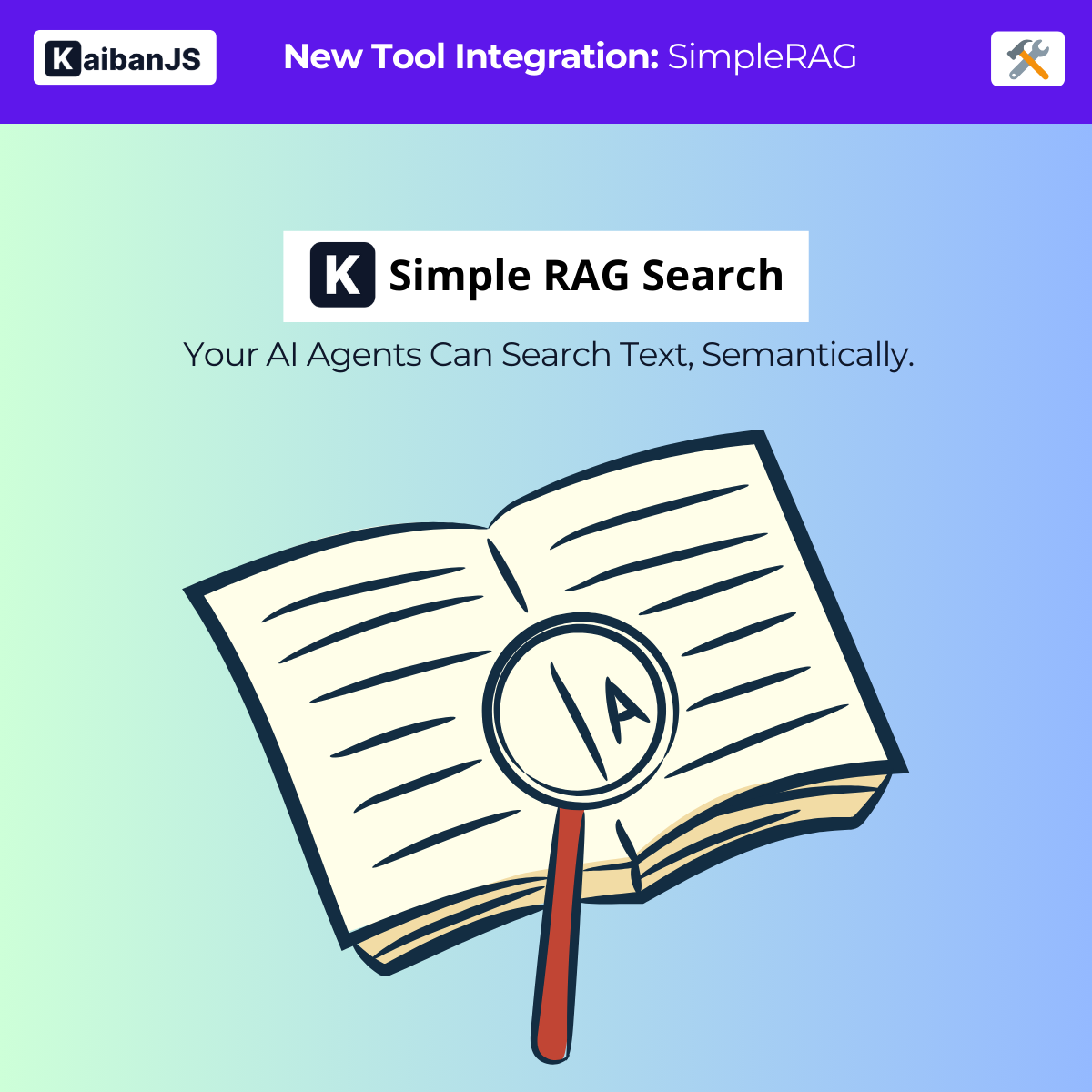Simple RAG Search Tool
Description
Simple RAG Search is a powerful Retrieval-Augmented Generation (RAG) tool that provides a streamlined interface for building question-answering systems. It seamlessly integrates with langchain components to deliver accurate and context-aware responses.

Enhance your agents with:
- Quick RAG Setup: Get started with RAG in minutes using default configurations
- Flexible Components: Customize embeddings, vector stores, and language models
- Efficient Processing: Smart text chunking and processing for optimal results
- OpenAI Integration: Built-in support for state-of-the-art language models
Installation
First, install the KaibanJS tools package:
npm install @kaibanjs/tools
API Key
Before using the tool, ensure you have an OpenAI API key to enable the RAG functionality.
Example
Here's how to use the SimpleRAG tool to enable your agent to process and answer questions about text content:
import { SimpleRAG } from '@kaibanjs/tools';
import { Agent, Task, Team } from 'kaibanjs';
// Create the tool instance
const simpleRAGTool = new SimpleRAG({
OPENAI_API_KEY: 'your-openai-api-key',
content: 'Your text content here'
});
// Create an agent with the tool
const knowledgeAssistant = new Agent({
name: 'Alex',
role: 'Knowledge Assistant',
goal: 'Process text content and answer questions accurately using RAG technology',
background: 'RAG Specialist',
tools: [simpleRAGTool]
});
// Create a task for the agent
const answerQuestionsTask = new Task({
description: 'Answer questions about the provided content using RAG technology',
expectedOutput: 'Accurate and context-aware answers based on the content',
agent: knowledgeAssistant
});
// Create a team
const ragTeam = new Team({
name: 'RAG Analysis Team',
agents: [knowledgeAssistant],
tasks: [answerQuestionsTask],
inputs: {
content: 'Your text content here',
query: 'What questions would you like to ask about the content?'
},
env: {
OPENAI_API_KEY: 'your-openai-api-key'
}
});
Advanced Example with Pinecone
For more advanced use cases, you can configure SimpleRAG with a custom vector store:
import { PineconeStore } from '@langchain/pinecone';
import { Pinecone } from '@pinecone-database/pinecone';
import { OpenAIEmbeddings } from '@langchain/openai';
const embeddings = new OpenAIEmbeddings({
apiKey: process.env.OPENAI_API_KEY,
model: 'text-embedding-3-small'
});
const pinecone = new Pinecone({
apiKey: process.env.PINECONE_API_KEY
});
const pineconeIndex = pinecone.Index('your-index-name');
const vectorStore = await PineconeStore.fromExistingIndex(embeddings, {
pineconeIndex
});
const simpleRAGTool = new SimpleRAG({
OPENAI_API_KEY: 'your-openai-api-key',
content: 'Your text content here',
embeddings: embeddings,
vectorStore: vectorStore
});
Parameters
OPENAI_API_KEYRequired. Your OpenAI API key for embeddings and completions.contentRequired. The text content to process and answer questions about.embeddingsOptional. Custom embeddings instance (defaults to OpenAIEmbeddings).vectorStoreOptional. Custom vector store instance (defaults to MemoryVectorStore).chunkOptionsOptional. Configuration for text chunking (size and overlap).
Is there something unclear or quirky in the docs? Maybe you have a suggestion or spotted an issue? Help us refine and enhance our documentation by submitting an issue on GitHub. We're all ears!